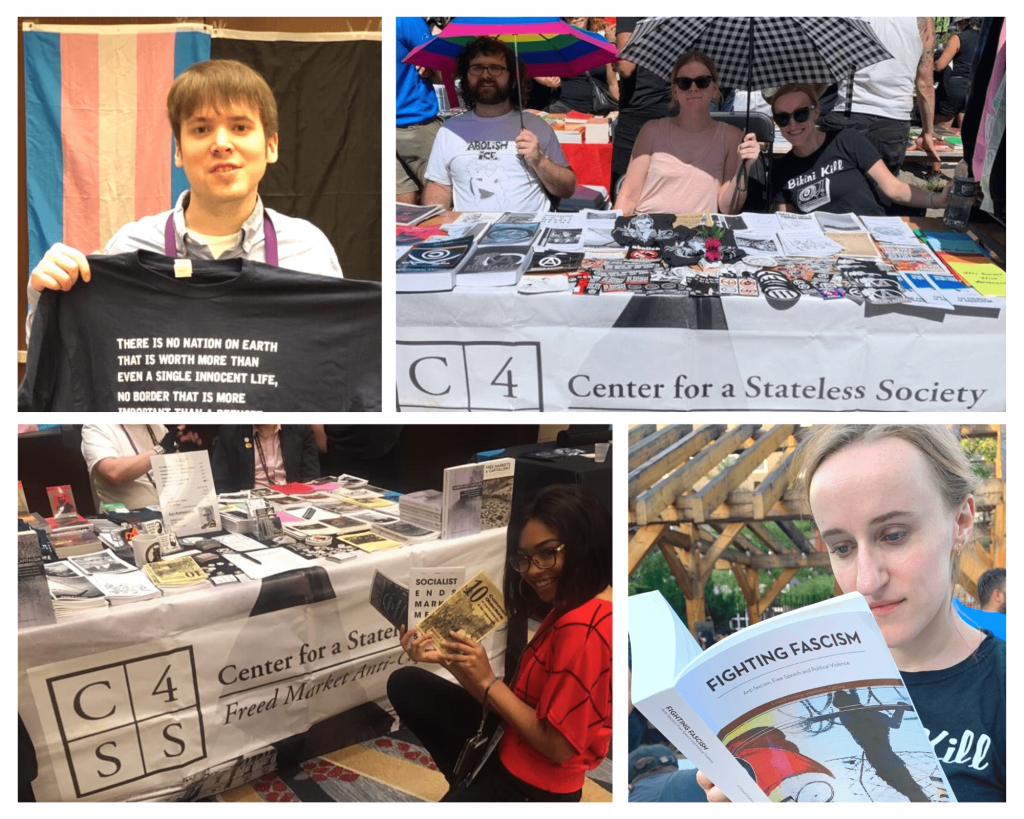Por Locusts and Wild Honey. Artículo original escrito el 5 de enero de 2023 con el título Quakerism, Anarchy, and Everything in Between. Traducido al español por Camila Figueroa.
Los cuáqueros o Amigos son miembros de la Sociedad Religiosa de los Amigos, una secta religiosa arraigada en el cristianismo protestante que no se limita a ningún credo o teología en particular, sino que se une por una oposición a la violencia y una creencia común en el Dios, la Divinidad y/o la Luz en todos los seres humanos. En A Quaker Book of Wisdom, Robert Lawrence Smith describe el cuaquerismo como “un experimento de anarquía religiosa”. Más extensamente, la página de Wikipedia (con perdón) para “Anarquismo y religión” afirma:
La iglesia cuáquera, o Sociedad Religiosa de los Amigos, está organizada según líneas anarquistas. Todas las decisiones se toman localmente en una comunidad de iguales donde cada voz [de los miembros] tiene el mismo peso. Aunque no existen vínculos formales entre el cuaquerismo y el anarquismo, y los cuáqueros en su conjunto tienen una amplia variedad de opiniones políticas, la larga tradición de participación cuáquera en el trabajo por la justicia social y las perspectivas similares sobre cómo debe estructurarse el poder y cómo deben tomarse las decisiones han dado lugar a un cruce significativo de miembros e influencia entre los anarquistas cristianos y los cuáqueros. La influencia cuáquera fue especialmente pronunciada en el movimiento antinuclear de la década de 1980 y en el movimiento antiglobalización norteamericano, que incluían a muchos miles de anarquistas y adoptaban conscientemente aspectos seculares y basados en el consenso de la toma de decisiones cuáquera.
Y a pesar de “no tener vínculos formales”, el profesor Ben Pink Dandelion cuenta en un vídeo para QuakerSpeak cómo empezó como activista anarquista en los años 80, pero se desilusionó con una estrategia de huelga revolucionaria. Entonces recurrió a los Amigos, que son “un grupo comprometido con la paz, un grupo que no votaba como los anarquistas y que no tenía un liderazgo fijo”.
Profundizando en la naturaleza anarquista del cuaquerismo: en una época en la que se esperaba que uno usara “usted” y “su”, hiciera reverencias y se quitara el sombrero en presencia de la aristocracia, los Amigos se negaban a reconocer esa desigualdad artificial y no practicaban ninguna de esas normas sociales. Se referían a todo el mundo -independientemente de su estatus- con “tú” y “tú”. De forma similar, muchos Amigos rechazan los títulos y no practican la jerarquía dentro de la fe. Creen en el sacerdocio de todos los creyentes, en la santidad de cualquier grupo de culto independientemente de su ubicación, en el poder de la palabra espontánea en lugar de los sermones planificados/centralizados, y -como se menciona en la cita de Wikipedia- en la toma de decisiones por consenso. Como relata Margaret Hope Bacon en The Quiet Rebels (Los rebeldes silenciosos)
En [la] estructura flexible [de las reuniones], las decisiones no se toman por votación, sino porque el grupo en su conjunto llega a una conclusión común. Tras el debate, en una reunión mensual por ejemplo, un secretario declara lo que considera que es el sentido de la reunión, pero si un solo Amigo considera que no puede unirse al grupo, no se toma ninguna decisión. Del mismo modo, una reunión trimestral no tomará una decisión sin el apoyo de todos sus grupos miembros. El proceso es lento, pero el milagro es que finalmente se toman decisiones.
La estructura horizontal del culto cuáquero se refleja incluso en las estructuras físicas de las reuniones cuáqueras. Ralph Hetherington explica, por ejemplo, que
Los cuáqueros no tienen edificios eclesiásticos como tales. De hecho, la Reunión para el Culto puede tener lugar en cualquier lugar y no necesita ningún edificio especialmente consagrado. No hay altar ni púlpito. Los asientos se disponen en círculo o en un cuadrado hueco, alrededor de una mesa en la que hay libros y, posiblemente, un jarrón con flores. No se hace hincapié en la administración de los sacramentos ni en la exposición de la palabra de Dios, sino más bien en la experiencia del grupo que celebra el culto.
En conjunto, este rechazo de la jerarquía social (e incluso física) se asemeja mucho a una aplicación sociorreligiosa de la interpretación de Noam Chomsky…
[el núcleo de la tradición anarquista[:]… [El poder es siempre ilegítimo, a menos que demuestre ser legítimo. Así que la carga de la prueba recae siempre sobre quienes afirman que alguna relación jerárquica autoritaria es legítima. Si no pueden demostrarlo, hay que desmantelarla.
De hecho, el amigo Tim Sowerbutt cuenta que los Amigos “simpatizaban mucho con las fuerzas no franquistas [durante la Guerra Civil española], porque el aspecto del cuaquerismo que significa que no hay un líder o autoridad central es bastante familiar para el anarquismo español”. El proceso de consenso cuáquero también es alabado por el anarquista y Amigo Robert Kirchner como una posible solución al debate entre anarquistas pro y antidemocracia que aceptan falsamente la noción de que la toma de decisiones colectiva debe ser necesariamente coercitiva en un grado u otro y que el debate fundamental es sobre si esta coerción es aceptable o no en una sociedad anarquista.
Los Amigos no tienen escrituras oficiales, pero un texto muy importante es el Diario de George Fox, escrito por el fundador titular de la secta en el siglo XVII. Y, curiosamente, el Diario contiene mensajes tanto teológicos como prácticamente anarquistas. Por ejemplo, la proclama:
Por tanto, vosotros, que conocéis el amor de Dios, y la ley de su espíritu, y la libertad que hay en Jesucristo, manteneos firmes en él, en esa fe divina de la que él es autor en vosotros; y no os dejéis enredar con yugo de esclavitud. Porque el ministerio de Cristo Jesús, y su enseñanza, trae libertad y libertad; pero el ministerio que es del hombre, y por el hombre, que permanece en la voluntad del hombre, trae esclavitud, y bajo la sombra de muerte y tinieblas.
Esta afirmación está dirigida a las instituciones de la religión organizada que se aprovechan de los mansos con el fin de fortalecerse, pero también podría estar dirigida a la institución “del hombre y por el hombre” que es el Estado, que enreda a la mayor parte del mundo en el yugo de la esclavitud. También es interesante cómo Fox, mientras estaba (de forma rebelde) en la cárcel, “se sintió movido a escribir a los jueces acerca de cómo ejecutaban a los hombres por robo de ganado, dinero y cosas pequeñas; y a mostrarles lo contrario que era a la ley de Dios en el pasado” y en su lugar pidió “a los ladrones… que hicieran restitución”. Esto se acerca bastante al llamamiento de Chartier, en La conciencia de un anarquista, a favor de un sistema [de justicia] no estatal…
un sistema [de justicia] no estatal basado en las víctimas, en el que la gente presente demandas por daños y perjuicios contra los demás [donde] una persona real que afirme haber sufrido un daño real (o alguien que la sustituya) tenga que demostrar que realmente la has perjudicado para tener derecho a una indemnización. [En cambio, en un sistema basado en el Estado, que se caracteriza por la persecución de delitos por parte del Estado, éste no necesita demostrar que usted ha perjudicado a alguien de forma independiente y especificable para imponerle penas potencialmente severas”.
De forma relacionada, Bacon describe cómo a la segunda generación de Amigos de las colonias norteamericanas “se les pidió que no llevaran sus disputas a los tribunales de los pueblos del mundo, sino que las resolvieran dentro de la reunión”. En el mencionado rechazo cuáquero de la jerarquía, Fox proclama…
que ser criado en Oxford o Cambridge no era suficiente para hacer de un hombre un ministro de Cristo… [y] miraba menos a los sacerdotes y más a los disidentes. Entre ellos vi que había cierta ternura; y muchos de ellos vinieron después a convencerse, porque tuvieron algunas oportunidades.
Esto puede ser un poco exagerado, pero ¿quiénes son hoy los disidentes contra los sacerdotes de lo que Samuel Edward Konkin III llama “la Iglesia establecida de la [I]deología”, sino los anarquistas y los anarco-adyacentes; ¿los punks, los hippies, los libertarios radicales, los sindicalistas salvajes, los abolicionistas de las prisiones y la policía, los revolucionarios del Sur Global, los activistas por la paz, los que vuelven a la patria, etc.? Bacon incluso compara específicamente a Friends y a sus primeros contemporáneos sociorreligiosos rebeldes con los radicales de los años sesenta, escribiendo: “Al igual que los jóvenes disidentes de hoy, los Seekers, Ranters, Diggers y Quakers rechazaban la hipocresía incorporada de la sociedad de su época”.
Y el radicalismo del cuaquerismo se extiende más allá del antiautoritarismo organizativo y bíblico, ya que los Amigos casi siempre se han puesto del lado de la autoridad establecida; quizá en primer lugar por su temprana asociación con otros grupos radicales durante la Guerra Civil inglesa, como los Niveladores y los ya mencionados Diggers (Verdaderos Niveladores). Los primeros eran protoanarquistas que abogaban por una sociedad formada por comunas agrarias igualitarias y tierras en común. Nicolas Walter escribe:
Gerrard Winstanley, ideólogo de los Diggers o Verdaderos Niveladores, que se acercaron al anarquismo más que nadie antes de la Revolución Francesa, pasó en pocos años de citar la Biblia a invocar “la gran Razón Creadora”. La tradición fue continuada por los Ranters y los Seekers, los Quakers y los Shakers, y más tarde los Universalistas y los Unitarios, y puede verse en el movimiento pacifista moderno.
Los Niveladores son descritos por Libcom. org como “una alianza relativamente laxa de radicales y librepensadores” unidos por…
la creencia general de que todos los hombres eran iguales; puesto que esto era así, un gobierno sólo podía tener legitimidad si era elegido por el pueblo. Los niveladores exigían una república laica, la abolición de la Cámara de los Lores, la igualdad ante la ley, el derecho al voto para todos, el libre comercio, la abolición de la censura, la libertad de expresión y el derecho absoluto de las personas a practicar la religión que quisieran.
Y según Rhoda R. Gilmen, estas…
dos movimientos del siglo XVII que estuvieron estrechamente relacionados con la evolución del cuaquerismo podrían llamarse anarquistas en el sentido filosófico. Se trata de los Diggers [o Verdaderos Niveladores], que establecieron comunas agrícolas de corta duración por toda Inglaterra en 1649-50, y los Niveladores, un desafío más urbano y político a la aristocracia. Los líderes de ambos grupos, Gerard Winstanley y John Lilburne, sobrevivieron a la revolución y a la restauración de la monarquía para convertirse en cuáqueros en sus últimos años.
Entre los precursores del cuaquerismo se encontraban también los ya mencionados Buscadores y Falsarios, grupos desorganizados de cristianos antinomianos que luchaban contra lo que consideraban autoritarismo, especulación y corrupción política de casi todas las religiones organizadas de Europa.
Estos grupos contribuyeron a sentar las bases políticas del espíritu antiautoritario de todo el cuaquerismo. Esto es especialmente claro en la primera generación de Amigos. Como resume Stuart Masters
Creían que ya no estaban sometidos a la autoridad humana, que Cristo gobernaba dentro de ellos y que esa era su máxima autoridad, que los gobiernos humanos estaban a punto de morir, que el reino de los cielos estaba llegando… cuando eso no ocurriera, los cuáqueros tendrían que sobrevivir en el mundo tal y como era y querían tolerancia, que se les respetara y que no se les viera como una amenaza para los que estaban en el poder”, se desalientan los pronunciamientos apocalípticos y las advertencias proféticas, la atención se centra en preservar ciertas peculiaridades cuáqueras y en defender la tolerancia religiosa, en lugar de lo que podría llamarse, en cierto sentido, una especie de posición anarquista cristiana que era fuerte en esa primera generación.
Este espíritu no cesó tras el final de la Guerra Civil inglesa e incluso puede encontrarse entre los Amigos Whig y favorables a la monarquía, como William Penn, quien, al menos en el ámbito de la teología, explica que los Amigos “no exigían conformidad a ninguna autoridad humana”. Bacon argumenta en consecuencia que Penn “parece haber creído que habría muy poca necesidad de los aspectos coercitivos del Estado [en Pensilvania], que finalmente se marchitaría, dejando una comunidad santa”. Y la actualidad de este proyecto es identificada por Konkin, quien señala que…
[Algunos de estos [‘hombres y mujeres’ que ‘derivaron las ideas de libertad y defendieron la libertad tal y como la entendían con poca comprensión de la mecánica de la acción humana’], como los cuáqueros de Pensilvania, establecieron colonias lejos del estatismo depredador y desarrollaron la paz y el comercio con los nativos.
Por supuesto, esto no exime a los cuáqueros de la culpa del proyecto estatista de colonización en Norteamérica, pero representa la voluntad de romper con él y con la violencia que conlleva en la medida de lo posible. La Comisión Histórica y Museística de Pensilvania relata incluso cómo, entre 1682 y 1775, Pensilvania no tuvo ejército permanente y sólo contó con compañías de voluntarios temporales y espontáneos que, en 1775, acabaron organizándose en batallones descentralizados por municipios. Esta línea de vida anticentralista y antiviolencia continuó con algunos Amigos radicales en el siglo XIX que creían, como cuenta Thomas D. Hamm, “que el gobierno humano era, por su propia naturaleza, anticristiano, [y por lo tanto] ningún cristiano consecuente podía tener nada que ver con él”. Muchos argumentaban así que si la guerra y la fuerza eran malas, entonces era igualmente malo participar en la elección de los hombres que usarían la espada o serían el comandante en jefe”.
El compromiso de los Amigos con la libertad humana se extiende más allá de los confines de las comunidades cuáqueras, y sus miembros han desempeñado un importante papel en algunas de las luchas más importantes de los últimos cientos de años. “Quakers and Slavery” (Los cuáqueros y la esclavitud) -un proyecto de los colegios universitarios de Haverford y Swarthmore- identifica que no sólo “[l]as primeras organizaciones antiesclavistas de América y Gran Bretaña [estaban] formadas principalmente por miembros de la Sociedad de los Amigos”, sino que…
La Sociedad Religiosa de los Amigos… fue el primer organismo corporativo en Gran Bretaña y Norteamérica que condenó plenamente la esclavitud como ética y religiosamente errónea en todas las circunstancias. Es en los registros cuáqueros donde tenemos algunas de las primeras manifestaciones del sentimiento antiesclavista, que datan del siglo XVII. A partir de la década de 1750, los cuáqueros se dedicaron activamente a intentar influir en la opinión pública de Gran Bretaña y América contra la trata de esclavos y la esclavitud en general. Al mismo tiempo, los cuáqueros se implicaron activamente en el bienestar económico, educativo y político de los antiguos esclavos.
Esto continuó en el siglo XIX con la aparición del movimiento antiesclavista dominante en Estados Unidos, mientras que al mismo tiempo mujeres cuáqueras como Lucretia Mott y Elizabeth Cady Stanton lideraban la lucha por el sufragio femenino. Luego, en el siglo XX, los Amigos participaron en las luchas del Movimiento por los Derechos Civiles -uno de los confidentes de Martin Luther King Jr. era el amigo comunista gay Bayard Rustin- y en la lucha contra la invasión estadounidense de Vietnam. Como parte del mencionado movimiento pacifista, los Amigos han sido precursores de la resistencia fiscal y la objeción de conciencia como prácticas de oposición a la guerra; utilizando ambas en la resistencia contra la guerra de Vietnam. Gilmen señala, en la misma época, al Movimiento por una Nueva Sociedad como “[un] ejemplo del siglo XX de los continuos paralelismos entre cuáqueros y anarquistas… que existieron en Estados Unidos de 1971 a 1988”. El MNS…
surgió directamente de los esfuerzos de los cuáqueros por llevar suministros médicos a ambos bandos durante la guerra [de Vietnam]. Bloqueados por las fuerzas armadas estadounidenses y asqueados por el consumismo y el militarismo inflados de la sociedad estadounidense, se volcaron esperanzados en la tarea de crear una “Nueva Sociedad” en su propio territorio.
Las actividades y proyectos del MNS han sido explorados desde una perspectiva anarquista por Andrew Cornell en su libro ¡Oponerse y Proponer!: Lessons from Movement for a New Society. Gilmen, basándose en este texto, identifica que:
[siguen vivas una serie de instituciones alternativas y contraculturales (la distinción no siempre está clara) que fueron fundadas y alimentadas por el MNS en Filadelfia y otros lugares del país. Incluyen cooperativas, empresas gestionadas colectivamente, fideicomisos de tierras, algunas comunidades intencionales y otras actividades que prefiguraban el futuro deseado y que permitían a sus miembros cumplir su aspiración de “vivir la revolución” ahora.
Junto con el papel desempeñado en Occupy Wall Street, el movimiento Black Lives Matter, el activismo medioambiental, etc., este es el legado político actual de la Sociedad Religiosa de los Amigos. Como tal, hay mucho terreno común entre los anarquistas y los de mentalidad anarquista y la Sociedad Religiosa de los Amigos, y mucho trabajo de base que hacer en el siglo 21 para cruzar explícitamente la polinización entre estas diversas comunidades y sus creencias. Un gran recurso ya se puede encontrar en el podcast ‘anarco-cuáquero’ Friendly Anarchism, que profundiza “en cuestiones relacionadas con el misticismo, la praxis radical, la teología, el empoderamiento, el antifascismo y las artes desde una perspectiva izquierdista de la Sociedad Religiosa de los Amigos”. Mi esperanza es que esta obra pueda participar en ese diálogo en curso reuniendo estas numerosas fuentes y, con suerte, empujando a los Amigos a reunirse con sus vecinos políticos y a los anarquistas a reunirse con sus vecinos teológicos.
Fuentes (no exhaustivas):
“1642-1652: The Diggers and the Levellers” por Steven en Libcom. org
A Quaker Book of Wisdom por Robert Lawrence Smith
“Activismo, anarquismo y poder”, de Noam Chomsky y Harry Kreisler.
An Agorist Primer, de Samuel Edward Konkin III
“Anarquismo y religión” de Nicolas Walter
“Anarquismo y religión” en Wikipedia
“Crear el Cielo en la Tierra: La visión radical de los primeros cuáqueros” de Stuart Masters
“De activistas ecologistas a aliados anarquistas, los cuáqueros están redefiniendo lo que significa ser cristiano” por Siobhan Hegarty
“Hicksite Quakers and the Antebellum Nonresistance Movement” por Thomas D. Hamm de Church History Vol. 63, No. 4
“How I Went From Being an Anarchist to a Quaker” por QuakerSpeak
“La toma de decisiones colectiva no coercitiva: Una perspectiva cuáquera” por Robert Kirchner
Oponerse y proponer!: Lecciones del Movimiento para una Nueva Sociedad”, de Andrew Cornell
“Quakers and Slavery” (Los cuáqueros y la esclavitud) de Haverford and Swarthmore Colleges
“Revolutionary War Records Overview” de la Comisión Histórica y de Museos de Pensilvania
La conciencia de un anarquista: Why It’s Time to Say Good-Bye to the State and Build a Free Society de Gary Chartier
El diario de George Fox, de George Fox
Los rebeldes silenciosos: La historia de los cuáqueros en América de Margaret Hope Bacon
The Rise and Progress of the People Called Quakers, de William Penn
“Universal Quakerism” por Ralph Hetherington de A Quaker Universalist Reader: Número 1
“El cuaquerismo universalista: A Seedbeed for Change” de Rhoda R. Gilman
Si te ha gustado este articulo y quieres apoyar a esta comunidad, puedes donar a través de este link: https://c4ss.org/apoyo




 Lihat lebih banyak foto di
Lihat lebih banyak foto di 





